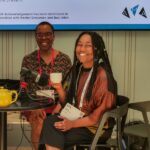
Learnings and Takeaways: job search after redundancy and squiggly careers
Learnings and Takeaways: job search after redundancy and squiggly careers
By
Natalie Chan
The second in a series of three posts by Arts Producer and Fundraiser Natalie Chan on surviving and thriving both professionally and personally in challenging times. She starts with an open and candid sharing of her personal journey navigating job changes, redundancy and a freelance career followed by her insight, learnings and practical tips on how to manage portfolio and squiggly careers.
We are hearing the term squiggly careers a lot more often now. I think it's fair to say that the mix of the aftermath of COVID, funding uncertainty and the continuing cost of living crisis has made us all much better at thinking about being resourceful. I'm always seeing uplifting quotes saying 'rejection is redirection', 'focus on what you can control', 'it's just a job at the end of day', 'it doesn’t define you', etc. I listened to all of those, and took comfort in this well-meaning advice during my job search, but at the end of the day, for the most of us, we do need to find practical ways of getting back on our feet. It doesn’t have to mean a full-time job, but some way of earning money, to live.
It's absolutely right to focus on what you can control, but in order for my career and life to carry on moving forwards - to be collaborating with and bringing the best out of people in my role as an arts producer and leader - I needed hiring managers to say yes, funding decisions to go my way, and others saying yes to working in partnerships. So this is my story and some insight and practical tips on what’s worked for me.
Just for some context: I arrived at my most recent job-hunt, in September 2024 after two short stints in leadership roles (feel free to skip over to the practical tips/strategies at the bottom, but this is just to share my route coming into a job-search and not having the best of CVs).
I was CEO at Kakilang from June 2023-March 2024, where I learned invaluable lessons in my first leadership role. I stayed on as a freelance producer on two projects following that, from March 2024-September 2024. Continuing with Kakilang as a freelance producer helped curb my doubts that no-one would ever want to work with me again and solidified the potential of producing as a pathway for me.
Working as a freelance producer for and with Kakilang allowed me to evolve my accountability with the core team with a respectful, graceful, supportive approach, providing reassurance and stewardship to the project freelancers, partners and stakeholders through company changes. I will always be proud that my work ensured those two projects were delivered, and that we did justice to the artists’ stories. And I will always be proud because this experience has unlocked a new level of courage and people skills for me. But, it was hard because I also knew, even with the new skills and personal qualities, I’d come to the end of the road with this once the two shows had been delivered in September 2024.
‘See you later’ is hard when one party doesn’t really know what they are going to do next, and I am going to try very hard to practice empathy on this more in future.
Happening in parallel to all of this, in April 2024 I said yes to the Executive Director job at Streatham Space Project. I remember coming to the interview in March 2024, on the same day that I wrapped everything up at Kakilang in the morning. I remember explaining honesty to the board why I only stayed in my previous role for a short time, the lessons I learned and what I’d do differently. It is in my nature to always have a generous interpretation of people’s intentions, so huge credit to them for taking a chance on me when I most needed it and for wanting to support me as a learning leader. What followed was a steep learning curve - navigating a financial crisis and a huge amount of responsible decision making. But five months later I was made redundant in September 2024 as part of the organisation's downsizing and eventual wind down.
Here’s the thing, if you really need work, if there's a timer on how much savings you have and your options are limited, say yes. I think it’s still easier to find a way through/get out and work it through later, than worrying about your immediate bank balance. Just my thoughts.
So, since finishing the two projects at Kakilang, and having left Streatham Space Project here’s what I did to support my continuing job search:
- I didn’t shy away from why I was looking for a new job, and I wrote about it as honestly as I could in cover letters. I put the focus on me, what I did, what I learned, what I’d then bring to the new role. Before wrapping up for Christmas 2024, I was at an all point low. I’d been hunting for 3-4 months and spent my savings to go travelling so I reached back out to all the hiring managers who rejected me at interview stage. I asked did my ‘not so straightforward’ CV play into it and all of them were kind enough to explain that they were impressed at how I presented myself. Reaching out to ask was not easy, but I had decided to try and be authentic and human about it and explain I’d been searching for a long time so any honest thoughts would be so helpful.
- I was still feeling anxious as the new year started, so I decided to ask for general recommendation letters from my previous employers, so that I could send it along with my Cover Letter and CV. My own confidence improved since doing it, and because people usually only check references at offer stage, sending this gave me comfort that I’d done everything I could.
- Think about your own strengths and your mental capacity as part of your job-search strategy - treat it like a project. I know there’s many ways to get a job including posting on LinkedIn, meeting people informally for coffee, reaching out to your warm contacts, attending networking events. At this moment in time, I know I would have preferred someone to have really taken the time to understand my story, read my well crafted cover letters and give me a formal interview with questions so that I could give examples to fully explain. I set my own limits - I knew that I didn't have the energy to sift through the messages, responses and general meetings after posting ‘open to work’ so instead I focused on formally applying to things where I know there’s a concrete job there. Knowing my limitations and prioritising where to put in the effort has worked for me.
Some other things I did:
- Make the most of any funding, training, opportunities and write in your application that you're unemployed/needing support in finding next steps. Be authentic and honest, which I was, and look for jobs that specify they're for people in between jobs. For me, the most important thing was that I was spending time with people in a similar position, and the reassurances, mutual uplifting really helped me get through. Because most of my friends were busy working this gave me a balanced view and the opportunity to see/spend time with different people with different perspectives of what’s going on in our industry.
- I also made sure, at a point where I had time on my hands, that I wasn’t “too proud” to attend events, or training that perhaps was a bit below the level I was working at (even if I already knew a lot of the things covered in the training). My reasons for attending a wide range of training was that many also included tips for networking and words of encouragement that were really helpful. They were also a good motivational space for me to start an application/email that I had been thinking about and not started yet.
This is me knowing myself and creating an environment for me to thrive - I encourage you to find the ‘thing’ that is right for you.

Natalie Chan, Arts Producer and Fundraiser





















